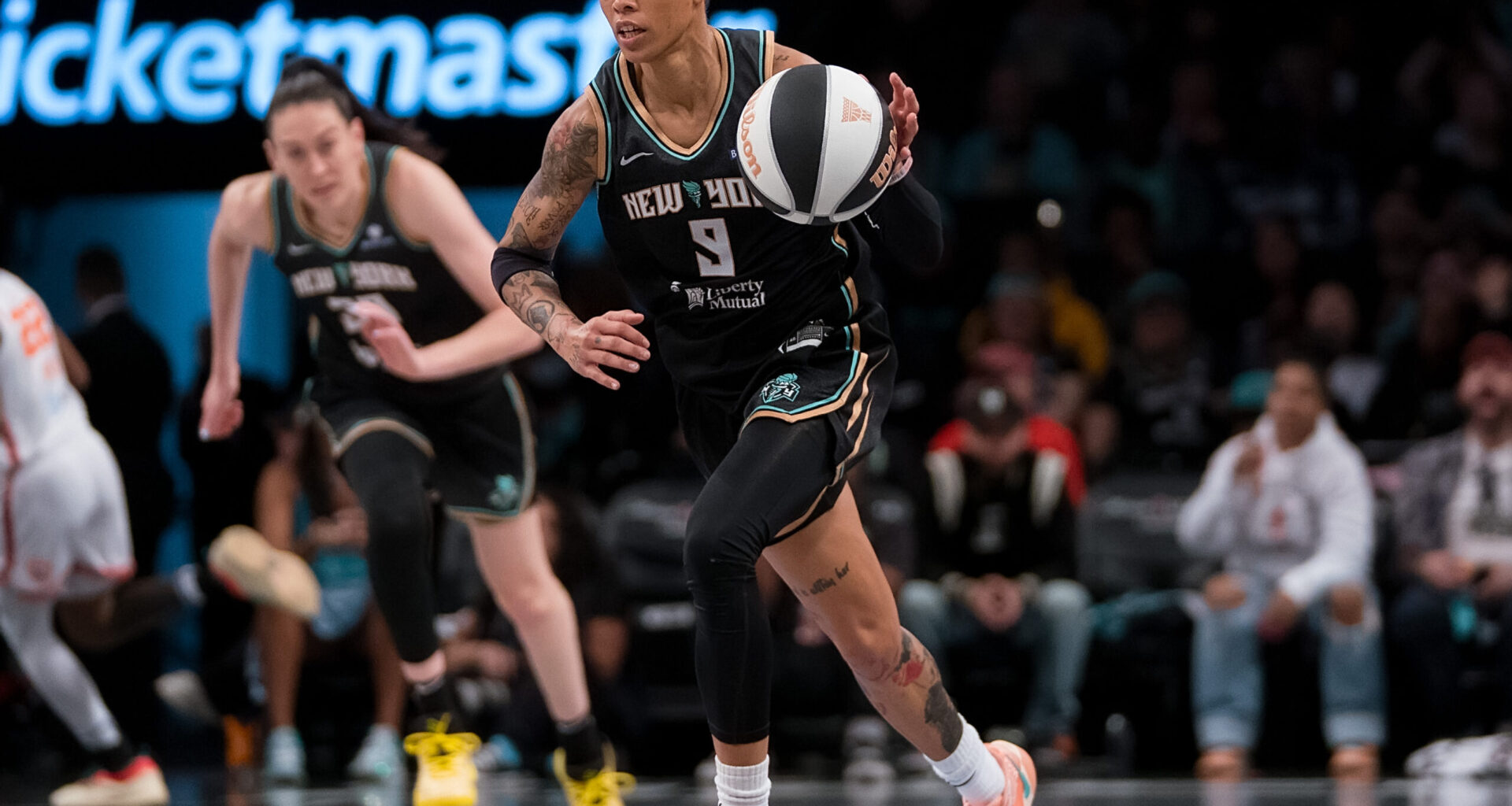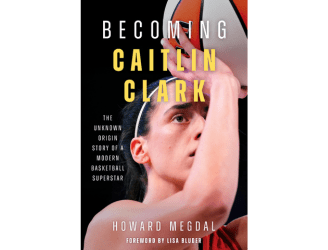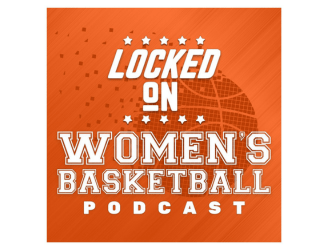But, where’s the line? When does booing shift from the soundtrack of competition to something more corrosive?
That question surfaced after DeWanna Bonner‘s return to Indiana, when Fever fans showered her with jeers. Signed in the offseason to bolster a young Fever core, Bonner was waived after playing in nine games and joined the Phoenix Mercury. Her return came with boos, even though she said she had “no regrets” about her Fever tenure in a Yahoo story.
Bonner’s teammate Kahleah Copper didn’t mince words in a postgame press conference, calling the response “disrespectful” and “unnecessary,” especially toward someone widely regarded as one of the greatest players in WNBA history. Retired legend Candace Parker, on the other hand, saw it differently.
On her Post Moves podcast, she suggested the boos reflected the league’s growth. “It’s a privilege to be booed,” she said, noting that only players who matter draw that kind of reaction.
“Becoming Caitlin Clark” is out now!
Howard Megdal’s newest book is here! “Becoming Caitlin Clark: The Unknown Origin Story of a Modern Basketball Superstar” captures both the historic nature of Clark’s rise and the critical context over the previous century that helped make it possible, including interviews with Clark, Lisa Bluder (who also wrote the foreword), C. Vivian Stringer, Jan Jensen, Molly Kazmer and many others.
Many players, such as the Washington Mystics‘ Shakira Austin, reframe the negativity as motivation, turning boos into fuel.
“I love it,” Austin told reporters during pregame availability against the Sparks on August 17 when asked how she feels about being booed. “I’m the type of person who thrives on it. People talking at the end of the day gets me going. … We just got to continue to build and create a space where we can compete and amplify winning basketball. I’ll take the boos. I’ll take the cheers, and I think most people will. We appreciate it.”
These may be contrasting takes, but they each pivot toward the same truth — it’s time to have an honest and hard conversation about fan behavior, both inside the arena and in the digital spaces where vitriol often festers unchecked.
That tension between players embracing boos and the league recognizing the harm it causes came to the surface last season in highly scrutinized incidents involving Caitlin Clark, DiJonai Carrington and Angel Reese. During the playoffs, Carrington was the subject of vile online threats. The WNBA, which denounced those threats with a statement, unveiled its “No Space for Hate” campaign after a challenging year in which poisonous discourse and threats were amplified.
The campaign is a season-long initiative that combines enhanced security, digital monitoring and mental health resources with a clear message: hostility has no place in the league’s arenas, nor in its online spaces. The league provides pregame videos, slips of paper in court-side seats and pop-up banners around arenas with reminders of expected fan etiquette.
As Hannah Huseman, founder of Mental Sweat LLC and a former mental health coach with the Texas Rangers and Philadelphia Phillies, explained, booing and the way players react to it is very individual. “I think for some people, it can have a profound impact on the court … and for others, it may not be heard at all,” Huseman said. “Maybe they’re good at blocking out the outside noise, and they’re good at focusing on the task at hand.”
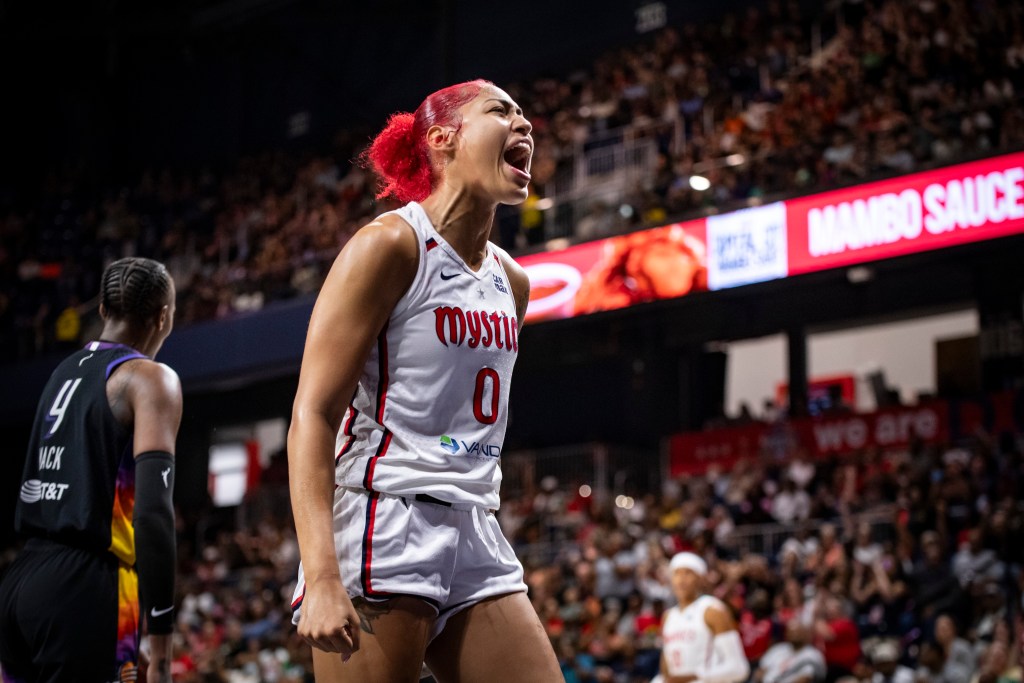 Washington Mystics center/forward Shakira Austin (0) reacts during a game against the Phoenix Mercury at CareFirst Arena in Washington, D.C., on July 27, 2025. (Photo credit: Domenic Allegra | The Next)
Washington Mystics center/forward Shakira Austin (0) reacts during a game against the Phoenix Mercury at CareFirst Arena in Washington, D.C., on July 27, 2025. (Photo credit: Domenic Allegra | The Next)
Showing love and working through the negativity
Fans rarely see the other side of the game. This includes the pregame hugs, countless moments of authenticity, playful interruptions and off-court support that reveal the league’s culture of respect. Those moments matter because they remind us that the WNBA’s story is bigger than jeers, even if the jeers are growing.
Fans don’t often witness wonderful pregame interactions such as Austin hugging Cameron Brink a few hours before they would be locked in an intense battle full of aggressive play. Yet, once the game is finished, there’s nothing personal. Fans also aren’t privy to Los Angeles Sparks veteran guard Kelsey Plum crashing Alysha Clark‘s pregame interview by pledging to donate money to her foundation. These types of moments occur all the time, and they push against the narrative that players dislike one another because of the passion displayed during games.
“I can’t speak on other people’s experiences,” Clark shared with The Next before the Mystics defeated the Sparks on August 17 at CareFirst Arena. “There’s always been banter, there’s always been people that say things about how you play. I haven’t had anything in person that has been volatile. You see it more on social media when people are behind keyboards, but they would never say that to you in person. I block all that out. I block people left and right on social media. I filter my feed because I don’t want to be exposed to that or read that.”
The distinction between competitive noise and hostility is becoming increasingly blurred in today’s climate, as toxic elements like gambling, social media and an entertainment culture that glorifies hostility often morph dogged play into nastiness. Players like Las Vegas’ A’ja Wilson and Reese have learned to navigate negativity, filter it out, and even turn it into platforms for empowerment.
“Ignoring negativity because it just comes with being true and secure in who you are,” Wilson told reporters before a game in Las Vegas recently. “No outside fan that has never done what you do on a nightly basis can ever tell you what to do or discourage you from doing something. Until they’ve been in your shoes and walked your life, they really shouldn’t have a say, and don’t allow that energy to even seep into your brain.”
Wilson’s words underscored the mental discipline it takes to block out outside voices. Yet in the social media era, even the best filters can’t stop the noise.
Want even more women’s sports in your inbox?
Subscribe now to The IX Sports and receive our daily women’s sports newsletter covering soccer, tennis, basketball, golf, hockey and gymnastics from our incredible team of writers. That includes Basketball Wednesday from founder and editor Howard Megdal.
Readers of The IX Basketball now save 50% on their subscription to The IX.
Psychologists have long observed that humans tend to pay more attention to negativity, a bias that today’s sports media and algorithms often exploit. Harmful content that triggers anger, fear or sadness, such as TikTok videos that amplify animosity, tends to spread faster than genuine connection, and platforms like X (formerly Twitter) often intensify those emotionally charged posts.
The result is a disappearance of nuance: athletes are cast as either heroes or villains, complex stories are reduced to soundbites, and positive work off the court is overshadowed. The constant churn of criticism, both on the court and on the internet, creates an environment where hostility feels louder than respect.
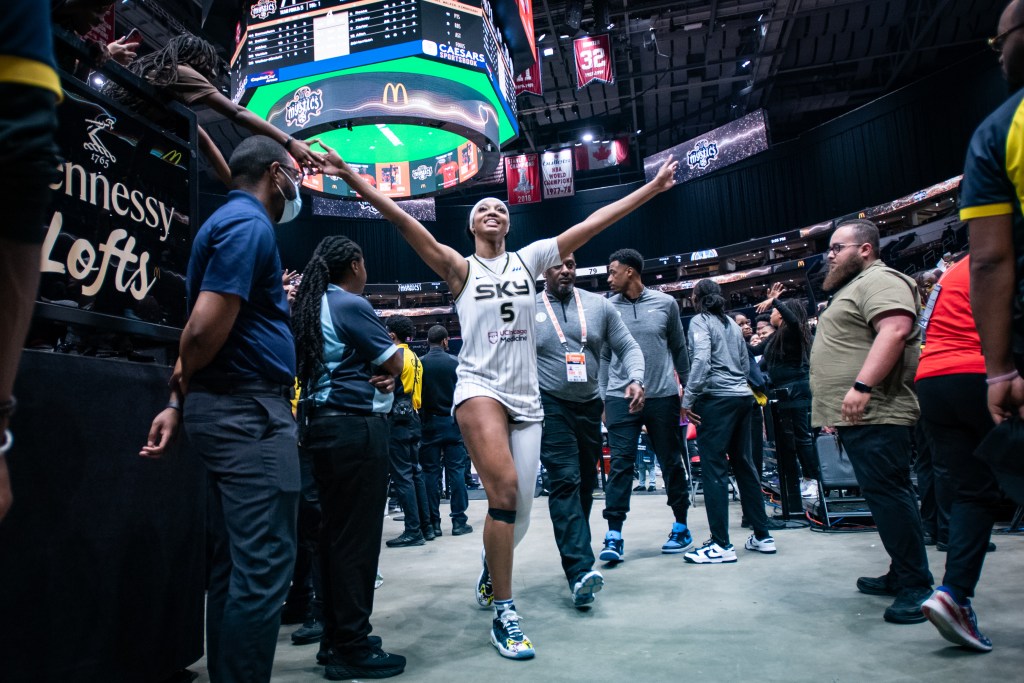 Chicago Sky forward Angel Reese waves to fans after a game against the Washington Mystics at the Capitol One Arena in Washington, D.C., on June 6, 2024. (Photo credit: Domenic Allegra | The Next)
Chicago Sky forward Angel Reese waves to fans after a game against the Washington Mystics at the Capitol One Arena in Washington, D.C., on June 6, 2024. (Photo credit: Domenic Allegra | The Next)
‘Cyberbullying is real’
Few players illustrate this better than Reese. Branded with the derisive nickname ‘mebounds’ by online trolls, the second-year Chicago Sky forward has flipped the insult into a serious conversation about cyberbullying, resilience and empowerment.
Reese has trademarked “Mebounds” and is selling merchandise that funds anti-cyberbullying work. Off the court, she’s poured energy into community projects, from refurbishing playgrounds to distributing over 2,000 school supply-filled backpacks in Chicago. She’s also the face of Reebok, appears on the cover of 2K26, and continues to grow her foundation.
Yet, much of this positivity rarely appears in headlines. For all of Reese’s success, she reminds people that the hate she endures is real, and the toll it has on her mental health is not to be disregarded.
“I’ve gotten rich off hate,” Reese shared with The Next before a game in Los Angeles on June 29 following her intense pregame shooting routine. “I’ve been able to do so many great things off of hate. … Cyberbullying is real. People deal with that shit every day. I don’t think we should take that lightly. Mental health is something I think we brush under the rug as well.”
For many players, including Reese, the hate is fuel. Still, it also underscores a more profound truth about how players live with constant scrutiny and must maintain an endless balancing act of controlling what they can and blocking out what they can’t.
“I try to focus on what I can focus on,” Reese explained. “The real know who I am. I won a national championship, and everything that came with it, which was positive, but obviously, I can’t control the narrative. … I keep the main thing the main thing, and that’s basketball. … I’m happy to be where I am as long as my family and my friends and people around me are good, that’s all I care about. I try to give back to the community or somebody that’s in need. … I don’t do it for show, I don’t do it for cameras or anything, but I know how much it’s important to have somebody to give back and being able to be an inspiration for young girls.”
The internet’s unforgiving role
Thirteen years into her career, Golden State Valkyrie veteran Tiffany Hayes has noticed how growing crowds and constant connectivity have changed the tenor of fan interactions.
“It’s just a little more intense now,” Hayes said. “I mean, there are a lot more fans in our league now, different fans that have come in at this time, and, you know, they might have come from the college space. So it’s just different fans. It was negative back then as well. However, it’s simply that there’s more internet available now. So, the more time you spend on the internet, the more you’ll encounter negativity — everybody’s talking about it and spreading the negativity.”
The constant exposure to negativity and online criticism can adversely impact the mental health of athletes, leading to decreased confidence, anxiety and burnout.
Some fans feel closer to players than ever before because of the access they provide into their personal lives, passions and personas online, which can sometimes lead to entitlement. Still, many players embrace the genuine connections they can foster with fans, both through in-person interactions and online avenues. Cameron Brink signed autographs before the Mystics game while Rickea Jackson posed for photos, reminders that moments of positivity carry weight. For Wilson, even the smallest gestures from fans matter.
“I would just focus on the fans who are positive,” Wilson said. “The love that they give — just a simple best of luck, best wishes — and not always just harping on the X’s and O’s of basketball goes a long way for me. To know that you care about me deeper than the uniform is always big.”
Tune in to Locked On Women’s Basketball
Here at The IX Basketball, in addition to the 24/7/365 written content our staff provides, we also host the daily Locked On Women’s Basketball podcast. Join us Monday through Saturday each week as we discuss all things WNBA, collegiate basketball, basketball history and much more. Listen wherever you find podcasts or watch on YouTube.
Hayes acknowledged that negativity spreads faster in today’s hyper-connected world. Yet for veterans like Natasha Cloud, the growth of the game has also brought a different perspective: the joy of watching fandom itself evolve. In her 10th year, Cloud sees both the scars of criticism and the beauty of progress.
“The trajectory of our fan base? It’s night and day,” Cloud said. “Years ago, we weren’t playing in Barclays. We were in Westchester. MSG wasn’t filled for us the way it is now. To see where we’ve come from, and where we’re headed — it’s a beautiful thing. This is my 10th year in the league, and I’m thankful I’ve been part of both the growing process of our game.”
She pointed to New York fans as an example of how boos and cheers can coexist with respect.
“I’ve always felt love in arenas like Barclays,” Cloud said, even when she was an opponent and now in her first year as a member of the Liberty. “I could come in, talk my shit, play hard, and yeah, maybe get booed or jaw back and forth. But after the game? It’s always love, because they appreciate how hard you play.
“There’s still a standard here,” Cloud continued. “If we’re booing you, maybe look inward at why. But overall, our fan base is really cool. Even when we played in Valhalla, their fans were super sweet and supportive. We can have our rivalries, but at the end of the day, it’s all love. That’s part of what makes this league special — the fans are just as important to the game as we are.”
Cloud didn’t shy away from reminding people of what players endure beyond the court.
“I always say, if every average Joe that talks shit on Twitter had to do a nine-to-five of our job, they’d stop real quick,” she said. “What we sacrifice with our families, the travel, what our bodies go through — mentally, physically, emotionally. … We already critique ourselves — I’ll be the first to tell you if I had too many turnovers. I don’t need you telling me I ruined your parlay … But if you talk a little shit during the game and then come up after like, ‘hey, I appreciate you,’ I’m good with that. It’s all love. That’s what this league is about.”
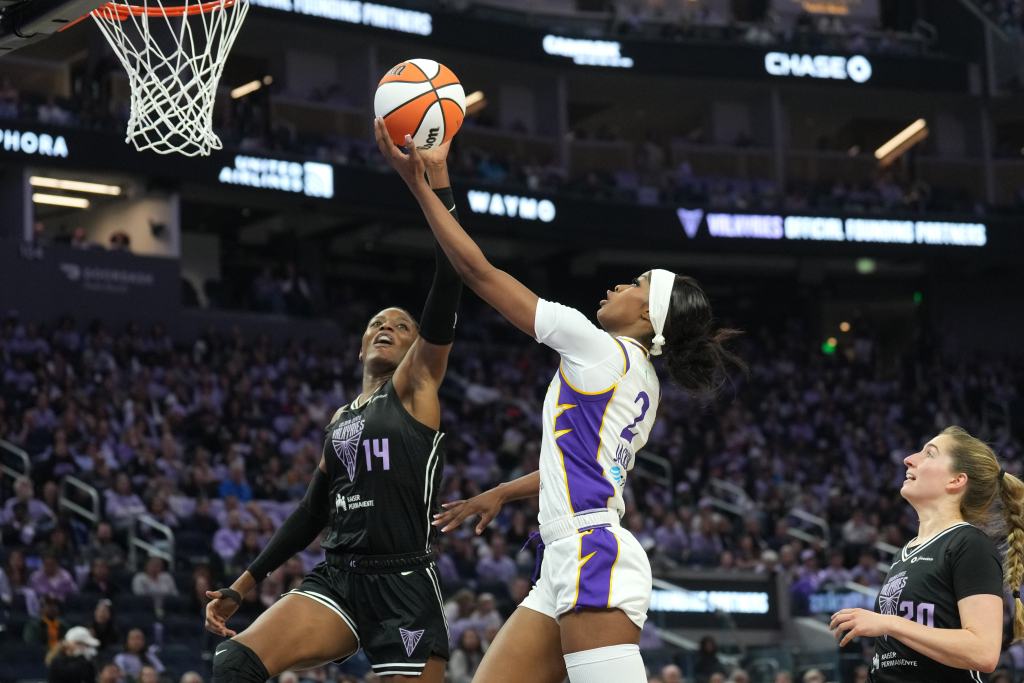 Los Angeles Sparks forward Rickea Jackson (2) shoots against Golden State Valkyries center Temi Fagbenle (14) and guard Kate Martin (right) at Chase Center in San Francisco on May 16, 2025. (Photo credit: Darren Yamashita | Imagn Images)
Los Angeles Sparks forward Rickea Jackson (2) shoots against Golden State Valkyries center Temi Fagbenle (14) and guard Kate Martin (right) at Chase Center in San Francisco on May 16, 2025. (Photo credit: Darren Yamashita | Imagn Images)
They’re only human
Even though players like Los Angeles Sparks second-year forward Rickea Jackson grew up with older brothers and played on the Detroit courts where trash-talking was a way of life, she knows that tough origin stories don’t give fans a license to be disrespectful toward players.
Yet too often social media users forget that WNBA players are humans. They’re mothers, daughters, sisters, aunts, cousins and friends. They play a game they love at the highest level, but players have plenty of layers to them.
“We’re humans too,” Jackson shared pregame before they played the Mystics. “We have lives outside of basketball. The only difference is we have cameras in our face — you probably do the same things at home, but I get criticized because it’s on camera. We don’t want to play badly, we don’t want to miss shots, we don’t want to turn the ball over. If we could be perfect, we’d choose to be perfect every night. But every night isn’t our night — so remember, we’re human.”
Huseman says players can draw on a toolkit of strategies to manage the noise and preserve performance — beginning with awareness, preparation and managing expectations before stepping into a hostile arena. Training the mind to focus on the right things at the right time is critical, as is developing routines to limit distractions such as handing off social media accounts, setting boundaries or filtering out toxic commentary before it reaches their eyes. Others lean on coping mechanisms in the moment, like deep breathing, listening to music or refocusing with a trusted teammate.
“Athletes carry so much on their plates, just like all of us,” Huseman added. “The key isn’t pretending the weight isn’t there. It’s learning how to carry it in a way that doesn’t break you, but strengthens you. The noise may never go away, but it doesn’t have to define you. With preparation and perspective, those moments of pressure can become reminders of how strong you’ve learned to be.”
Washington Mystics rookie guard Lucy Olsen echoed that sentiment and added a fresh perspective. Her positive words reflect both the reality of the challenges and the promise of growth. Even amid the noise, she feels gratitude for rising crowds, and with them, the hope that respect will grow alongside the league.
“I try to ignore the people that are just trying to bring you down,” Olsen said. “Everyone is here for a reason, and they didn’t just get lucky. Everyone has worked extremely hard to reach this point. Sometimes when people are just there trying to tear you down, you’ve got to look past it. … There’s no room for negativity anywhere. There’s no point in it; I’d rather have people at the games who genuinely care. You can’t control what they think. … They may be saying or doing the wrong things, but I think it’s great that people are coming to the games and the crowds are growing.”
Booing will always be part of competitions; fans will jeer not just in the WNBA, but for every sport, in every arena. But it doesn’t have to be the soundtrack. What defines the league is something bigger: a record-setting 2.5 million fans this season, the highest in history.
The WNBA’s story is one of joy, which is louder, prouder and more potent than the boos will ever be. Ultimately, it’s about the brilliance of its players, who elevate the game and drown out the noise — especially because they know they can handle it.
The Next’s Kelly Johnson, Jenn Hatfield and Jackie Powell contributed reporting to this story.

